Applying Kolb's Model: Reflection on Academic Learning & Toolkit
VerifiedAdded on 2023/06/15
|7
|1868
|436
Essay
AI Summary
This essay provides a detailed reflection on a student's learning and development throughout a semester, utilizing Kolb's Reflective Model to analyze experiences and identify areas for improvement. The reflection covers concrete experiences, reflective observation, abstract conceptualization, and active experimentation, highlighting the application of learned skills in academic and professional contexts. The student evaluates their strengths and weaknesses, particularly focusing on time management and management skills, and outlines plans for future academic endeavors. The essay concludes that reflection is a crucial tool for students to analyze their performance, learn from past experiences, and enhance their academic and professional growth. Desklib provides access to similar academic resources and solved assignments for students.
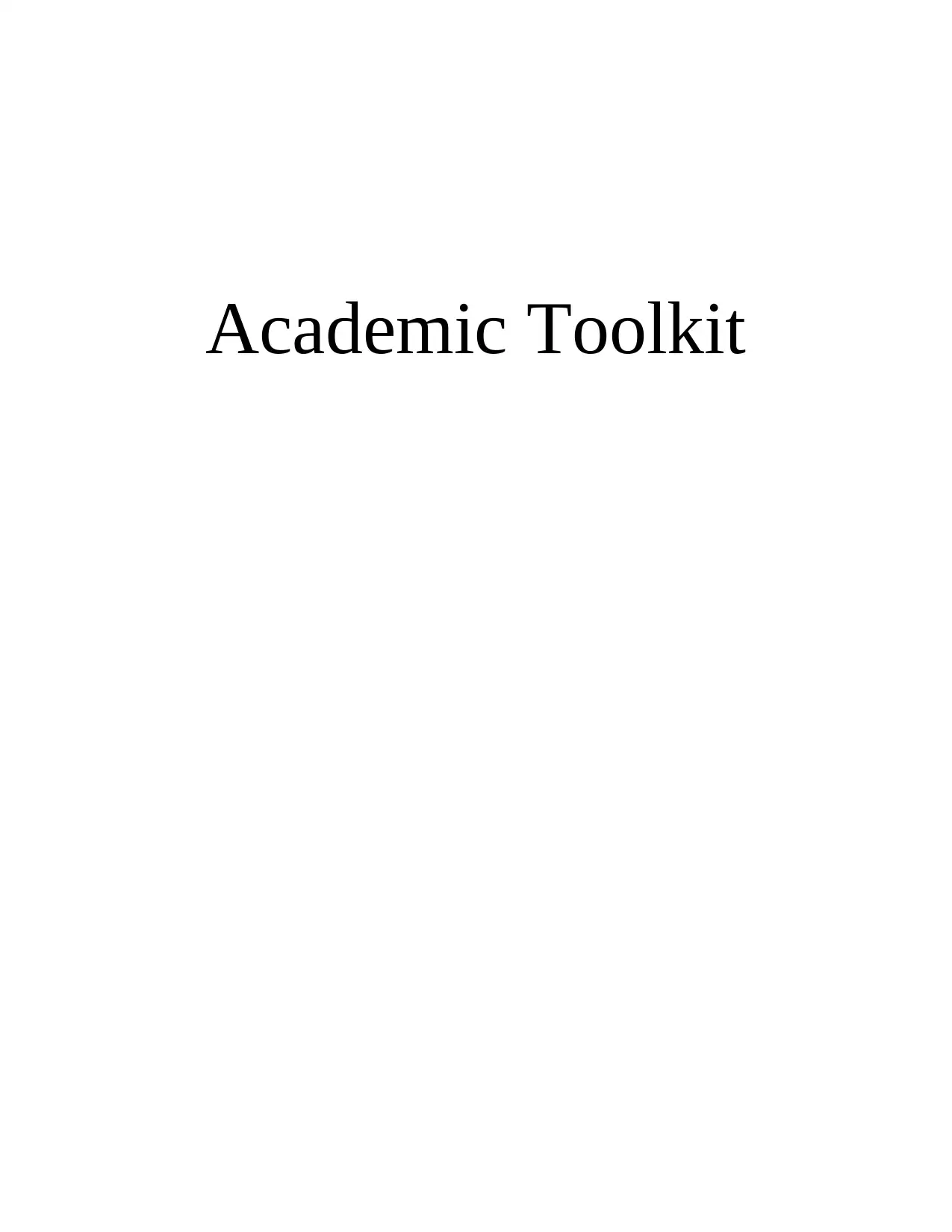
Academic Toolkit
Paraphrase This Document
Need a fresh take? Get an instant paraphrase of this document with our AI Paraphraser
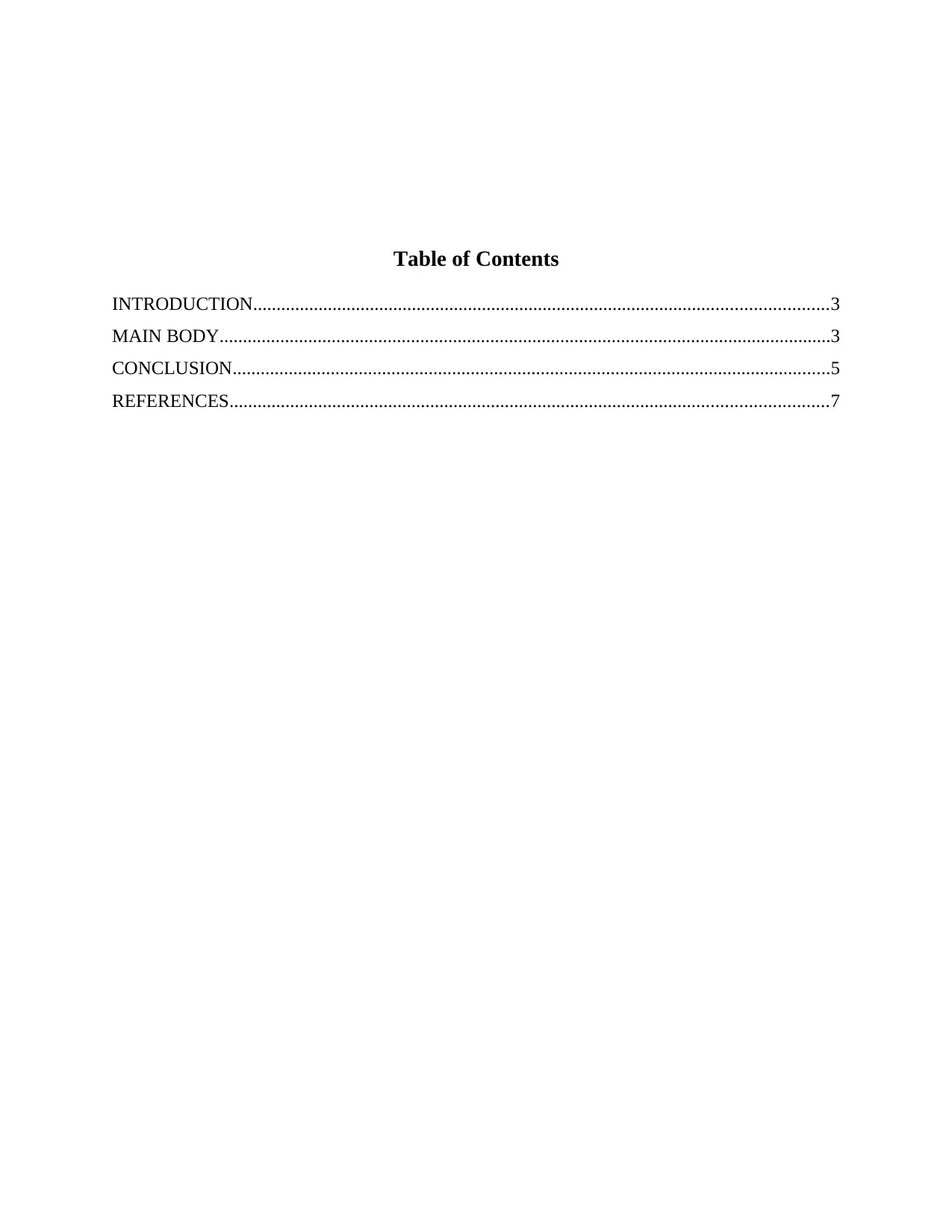
Table of Contents
INTRODUCTION...........................................................................................................................3
MAIN BODY...................................................................................................................................3
CONCLUSION................................................................................................................................5
REFERENCES................................................................................................................................7
INTRODUCTION...........................................................................................................................3
MAIN BODY...................................................................................................................................3
CONCLUSION................................................................................................................................5
REFERENCES................................................................................................................................7
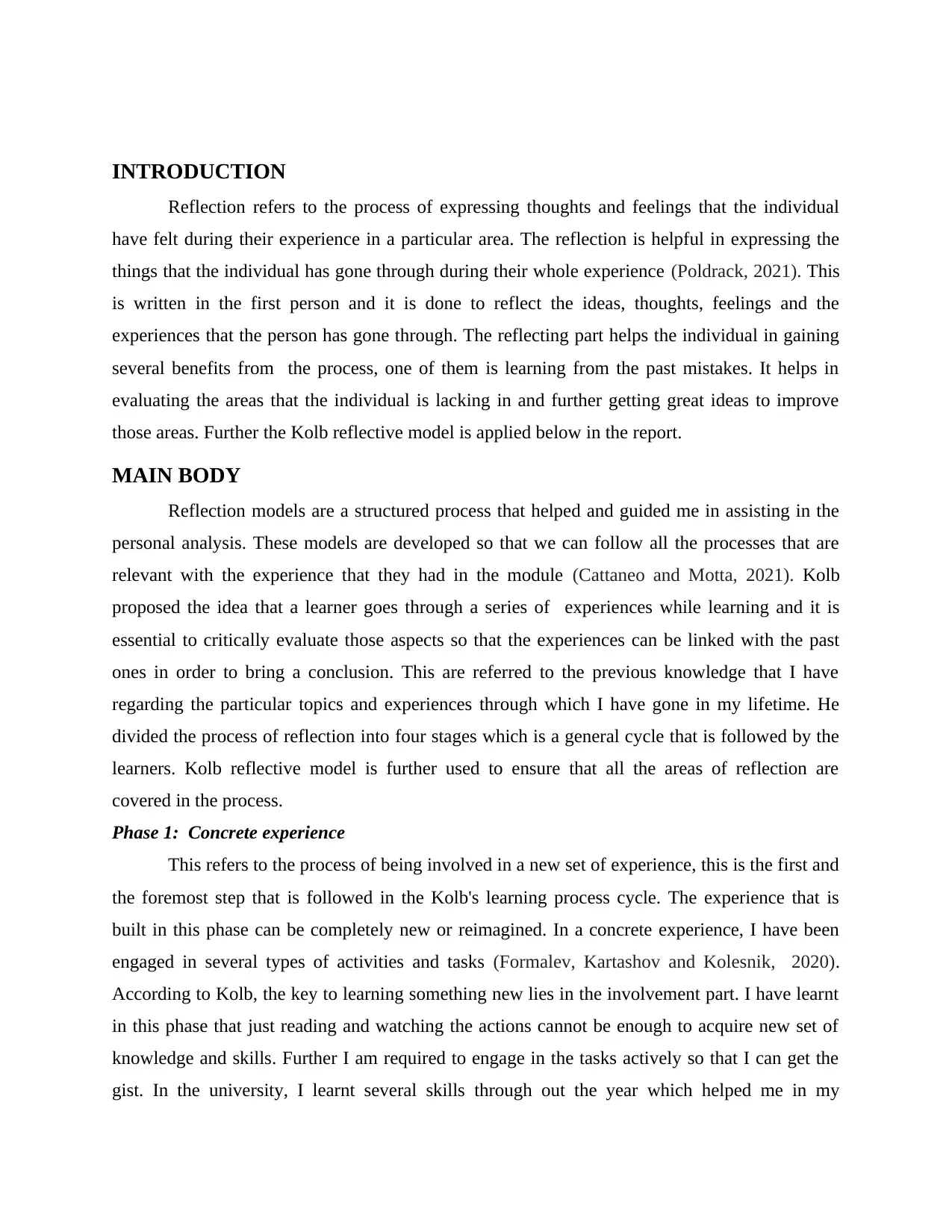
INTRODUCTION
Reflection refers to the process of expressing thoughts and feelings that the individual
have felt during their experience in a particular area. The reflection is helpful in expressing the
things that the individual has gone through during their whole experience (Poldrack, 2021). This
is written in the first person and it is done to reflect the ideas, thoughts, feelings and the
experiences that the person has gone through. The reflecting part helps the individual in gaining
several benefits from the process, one of them is learning from the past mistakes. It helps in
evaluating the areas that the individual is lacking in and further getting great ideas to improve
those areas. Further the Kolb reflective model is applied below in the report.
MAIN BODY
Reflection models are a structured process that helped and guided me in assisting in the
personal analysis. These models are developed so that we can follow all the processes that are
relevant with the experience that they had in the module (Cattaneo and Motta, 2021). Kolb
proposed the idea that a learner goes through a series of experiences while learning and it is
essential to critically evaluate those aspects so that the experiences can be linked with the past
ones in order to bring a conclusion. This are referred to the previous knowledge that I have
regarding the particular topics and experiences through which I have gone in my lifetime. He
divided the process of reflection into four stages which is a general cycle that is followed by the
learners. Kolb reflective model is further used to ensure that all the areas of reflection are
covered in the process.
Phase 1: Concrete experience
This refers to the process of being involved in a new set of experience, this is the first and
the foremost step that is followed in the Kolb's learning process cycle. The experience that is
built in this phase can be completely new or reimagined. In a concrete experience, I have been
engaged in several types of activities and tasks (Formalev, Kartashov and Kolesnik, 2020).
According to Kolb, the key to learning something new lies in the involvement part. I have learnt
in this phase that just reading and watching the actions cannot be enough to acquire new set of
knowledge and skills. Further I am required to engage in the tasks actively so that I can get the
gist. In the university, I learnt several skills through out the year which helped me in my
Reflection refers to the process of expressing thoughts and feelings that the individual
have felt during their experience in a particular area. The reflection is helpful in expressing the
things that the individual has gone through during their whole experience (Poldrack, 2021). This
is written in the first person and it is done to reflect the ideas, thoughts, feelings and the
experiences that the person has gone through. The reflecting part helps the individual in gaining
several benefits from the process, one of them is learning from the past mistakes. It helps in
evaluating the areas that the individual is lacking in and further getting great ideas to improve
those areas. Further the Kolb reflective model is applied below in the report.
MAIN BODY
Reflection models are a structured process that helped and guided me in assisting in the
personal analysis. These models are developed so that we can follow all the processes that are
relevant with the experience that they had in the module (Cattaneo and Motta, 2021). Kolb
proposed the idea that a learner goes through a series of experiences while learning and it is
essential to critically evaluate those aspects so that the experiences can be linked with the past
ones in order to bring a conclusion. This are referred to the previous knowledge that I have
regarding the particular topics and experiences through which I have gone in my lifetime. He
divided the process of reflection into four stages which is a general cycle that is followed by the
learners. Kolb reflective model is further used to ensure that all the areas of reflection are
covered in the process.
Phase 1: Concrete experience
This refers to the process of being involved in a new set of experience, this is the first and
the foremost step that is followed in the Kolb's learning process cycle. The experience that is
built in this phase can be completely new or reimagined. In a concrete experience, I have been
engaged in several types of activities and tasks (Formalev, Kartashov and Kolesnik, 2020).
According to Kolb, the key to learning something new lies in the involvement part. I have learnt
in this phase that just reading and watching the actions cannot be enough to acquire new set of
knowledge and skills. Further I am required to engage in the tasks actively so that I can get the
gist. In the university, I learnt several skills through out the year which helped me in my
⊘ This is a preview!⊘
Do you want full access?
Subscribe today to unlock all pages.

Trusted by 1+ million students worldwide
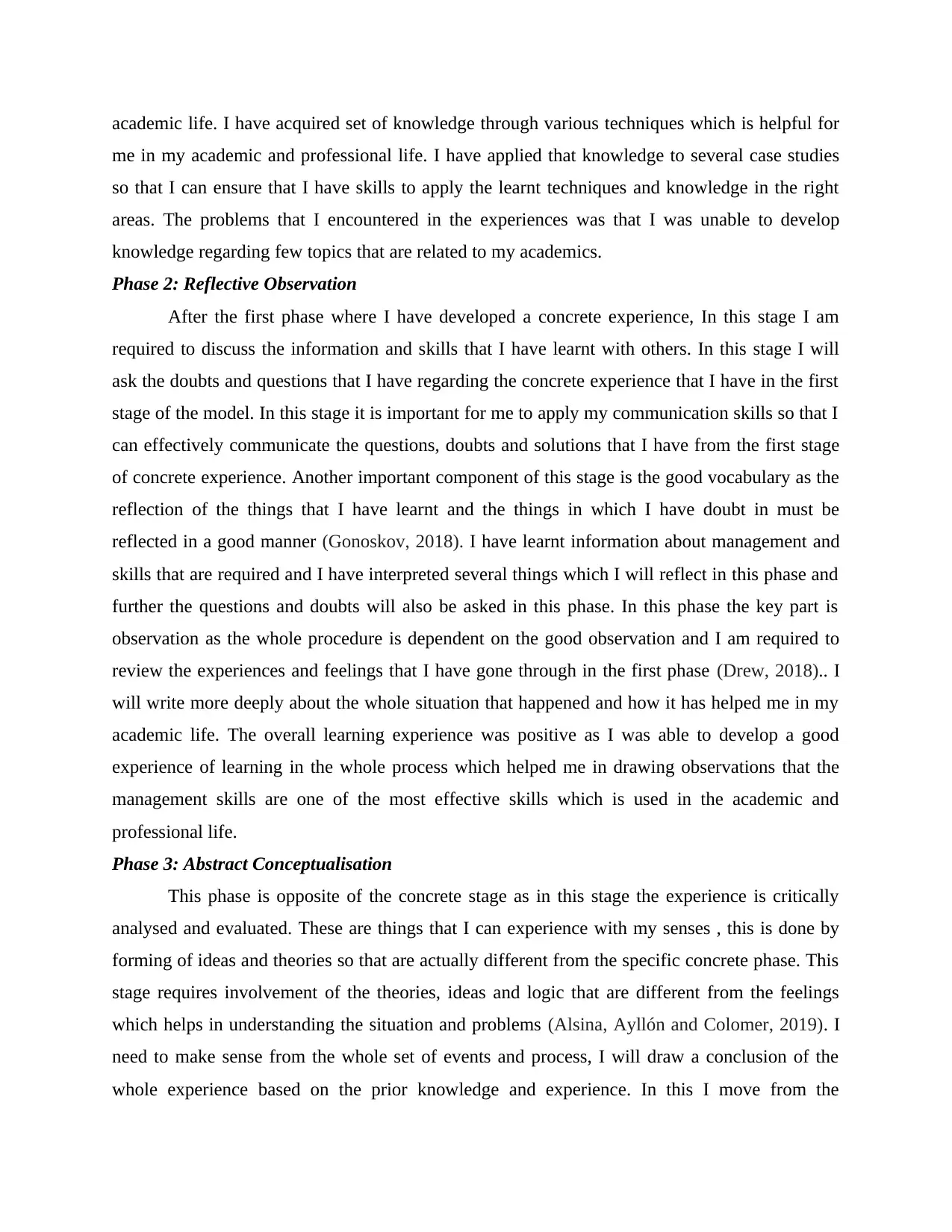
academic life. I have acquired set of knowledge through various techniques which is helpful for
me in my academic and professional life. I have applied that knowledge to several case studies
so that I can ensure that I have skills to apply the learnt techniques and knowledge in the right
areas. The problems that I encountered in the experiences was that I was unable to develop
knowledge regarding few topics that are related to my academics.
Phase 2: Reflective Observation
After the first phase where I have developed a concrete experience, In this stage I am
required to discuss the information and skills that I have learnt with others. In this stage I will
ask the doubts and questions that I have regarding the concrete experience that I have in the first
stage of the model. In this stage it is important for me to apply my communication skills so that I
can effectively communicate the questions, doubts and solutions that I have from the first stage
of concrete experience. Another important component of this stage is the good vocabulary as the
reflection of the things that I have learnt and the things in which I have doubt in must be
reflected in a good manner (Gonoskov, 2018). I have learnt information about management and
skills that are required and I have interpreted several things which I will reflect in this phase and
further the questions and doubts will also be asked in this phase. In this phase the key part is
observation as the whole procedure is dependent on the good observation and I am required to
review the experiences and feelings that I have gone through in the first phase (Drew, 2018).. I
will write more deeply about the whole situation that happened and how it has helped me in my
academic life. The overall learning experience was positive as I was able to develop a good
experience of learning in the whole process which helped me in drawing observations that the
management skills are one of the most effective skills which is used in the academic and
professional life.
Phase 3: Abstract Conceptualisation
This phase is opposite of the concrete stage as in this stage the experience is critically
analysed and evaluated. These are things that I can experience with my senses , this is done by
forming of ideas and theories so that are actually different from the specific concrete phase. This
stage requires involvement of the theories, ideas and logic that are different from the feelings
which helps in understanding the situation and problems (Alsina, Ayllón and Colomer, 2019). I
need to make sense from the whole set of events and process, I will draw a conclusion of the
whole experience based on the prior knowledge and experience. In this I move from the
me in my academic and professional life. I have applied that knowledge to several case studies
so that I can ensure that I have skills to apply the learnt techniques and knowledge in the right
areas. The problems that I encountered in the experiences was that I was unable to develop
knowledge regarding few topics that are related to my academics.
Phase 2: Reflective Observation
After the first phase where I have developed a concrete experience, In this stage I am
required to discuss the information and skills that I have learnt with others. In this stage I will
ask the doubts and questions that I have regarding the concrete experience that I have in the first
stage of the model. In this stage it is important for me to apply my communication skills so that I
can effectively communicate the questions, doubts and solutions that I have from the first stage
of concrete experience. Another important component of this stage is the good vocabulary as the
reflection of the things that I have learnt and the things in which I have doubt in must be
reflected in a good manner (Gonoskov, 2018). I have learnt information about management and
skills that are required and I have interpreted several things which I will reflect in this phase and
further the questions and doubts will also be asked in this phase. In this phase the key part is
observation as the whole procedure is dependent on the good observation and I am required to
review the experiences and feelings that I have gone through in the first phase (Drew, 2018).. I
will write more deeply about the whole situation that happened and how it has helped me in my
academic life. The overall learning experience was positive as I was able to develop a good
experience of learning in the whole process which helped me in drawing observations that the
management skills are one of the most effective skills which is used in the academic and
professional life.
Phase 3: Abstract Conceptualisation
This phase is opposite of the concrete stage as in this stage the experience is critically
analysed and evaluated. These are things that I can experience with my senses , this is done by
forming of ideas and theories so that are actually different from the specific concrete phase. This
stage requires involvement of the theories, ideas and logic that are different from the feelings
which helps in understanding the situation and problems (Alsina, Ayllón and Colomer, 2019). I
need to make sense from the whole set of events and process, I will draw a conclusion of the
whole experience based on the prior knowledge and experience. In this I move from the
Paraphrase This Document
Need a fresh take? Get an instant paraphrase of this document with our AI Paraphraser
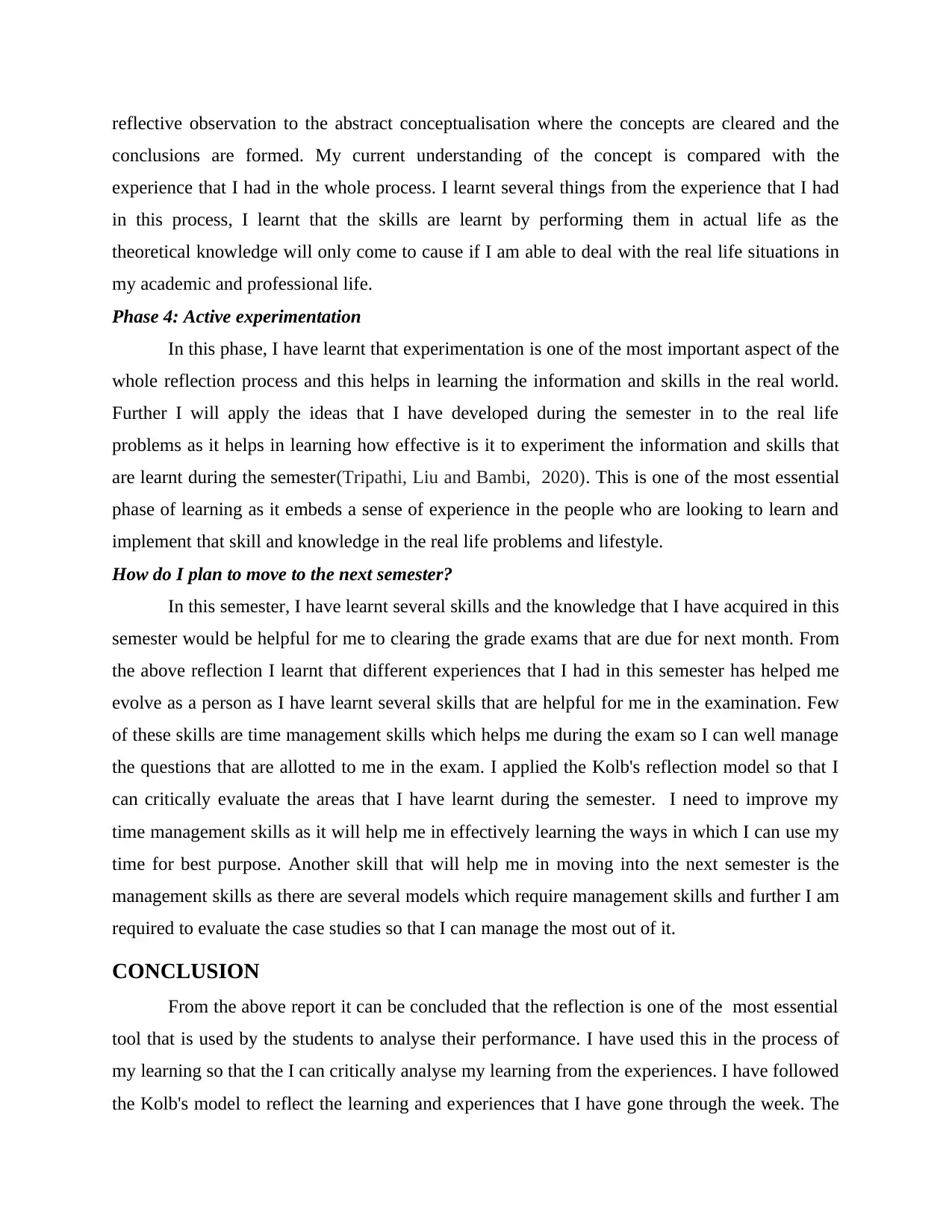
reflective observation to the abstract conceptualisation where the concepts are cleared and the
conclusions are formed. My current understanding of the concept is compared with the
experience that I had in the whole process. I learnt several things from the experience that I had
in this process, I learnt that the skills are learnt by performing them in actual life as the
theoretical knowledge will only come to cause if I am able to deal with the real life situations in
my academic and professional life.
Phase 4: Active experimentation
In this phase, I have learnt that experimentation is one of the most important aspect of the
whole reflection process and this helps in learning the information and skills in the real world.
Further I will apply the ideas that I have developed during the semester in to the real life
problems as it helps in learning how effective is it to experiment the information and skills that
are learnt during the semester(Tripathi, Liu and Bambi, 2020). This is one of the most essential
phase of learning as it embeds a sense of experience in the people who are looking to learn and
implement that skill and knowledge in the real life problems and lifestyle.
How do I plan to move to the next semester?
In this semester, I have learnt several skills and the knowledge that I have acquired in this
semester would be helpful for me to clearing the grade exams that are due for next month. From
the above reflection I learnt that different experiences that I had in this semester has helped me
evolve as a person as I have learnt several skills that are helpful for me in the examination. Few
of these skills are time management skills which helps me during the exam so I can well manage
the questions that are allotted to me in the exam. I applied the Kolb's reflection model so that I
can critically evaluate the areas that I have learnt during the semester. I need to improve my
time management skills as it will help me in effectively learning the ways in which I can use my
time for best purpose. Another skill that will help me in moving into the next semester is the
management skills as there are several models which require management skills and further I am
required to evaluate the case studies so that I can manage the most out of it.
CONCLUSION
From the above report it can be concluded that the reflection is one of the most essential
tool that is used by the students to analyse their performance. I have used this in the process of
my learning so that the I can critically analyse my learning from the experiences. I have followed
the Kolb's model to reflect the learning and experiences that I have gone through the week. The
conclusions are formed. My current understanding of the concept is compared with the
experience that I had in the whole process. I learnt several things from the experience that I had
in this process, I learnt that the skills are learnt by performing them in actual life as the
theoretical knowledge will only come to cause if I am able to deal with the real life situations in
my academic and professional life.
Phase 4: Active experimentation
In this phase, I have learnt that experimentation is one of the most important aspect of the
whole reflection process and this helps in learning the information and skills in the real world.
Further I will apply the ideas that I have developed during the semester in to the real life
problems as it helps in learning how effective is it to experiment the information and skills that
are learnt during the semester(Tripathi, Liu and Bambi, 2020). This is one of the most essential
phase of learning as it embeds a sense of experience in the people who are looking to learn and
implement that skill and knowledge in the real life problems and lifestyle.
How do I plan to move to the next semester?
In this semester, I have learnt several skills and the knowledge that I have acquired in this
semester would be helpful for me to clearing the grade exams that are due for next month. From
the above reflection I learnt that different experiences that I had in this semester has helped me
evolve as a person as I have learnt several skills that are helpful for me in the examination. Few
of these skills are time management skills which helps me during the exam so I can well manage
the questions that are allotted to me in the exam. I applied the Kolb's reflection model so that I
can critically evaluate the areas that I have learnt during the semester. I need to improve my
time management skills as it will help me in effectively learning the ways in which I can use my
time for best purpose. Another skill that will help me in moving into the next semester is the
management skills as there are several models which require management skills and further I am
required to evaluate the case studies so that I can manage the most out of it.
CONCLUSION
From the above report it can be concluded that the reflection is one of the most essential
tool that is used by the students to analyse their performance. I have used this in the process of
my learning so that the I can critically analyse my learning from the experiences. I have followed
the Kolb's model to reflect the learning and experiences that I have gone through the week. The
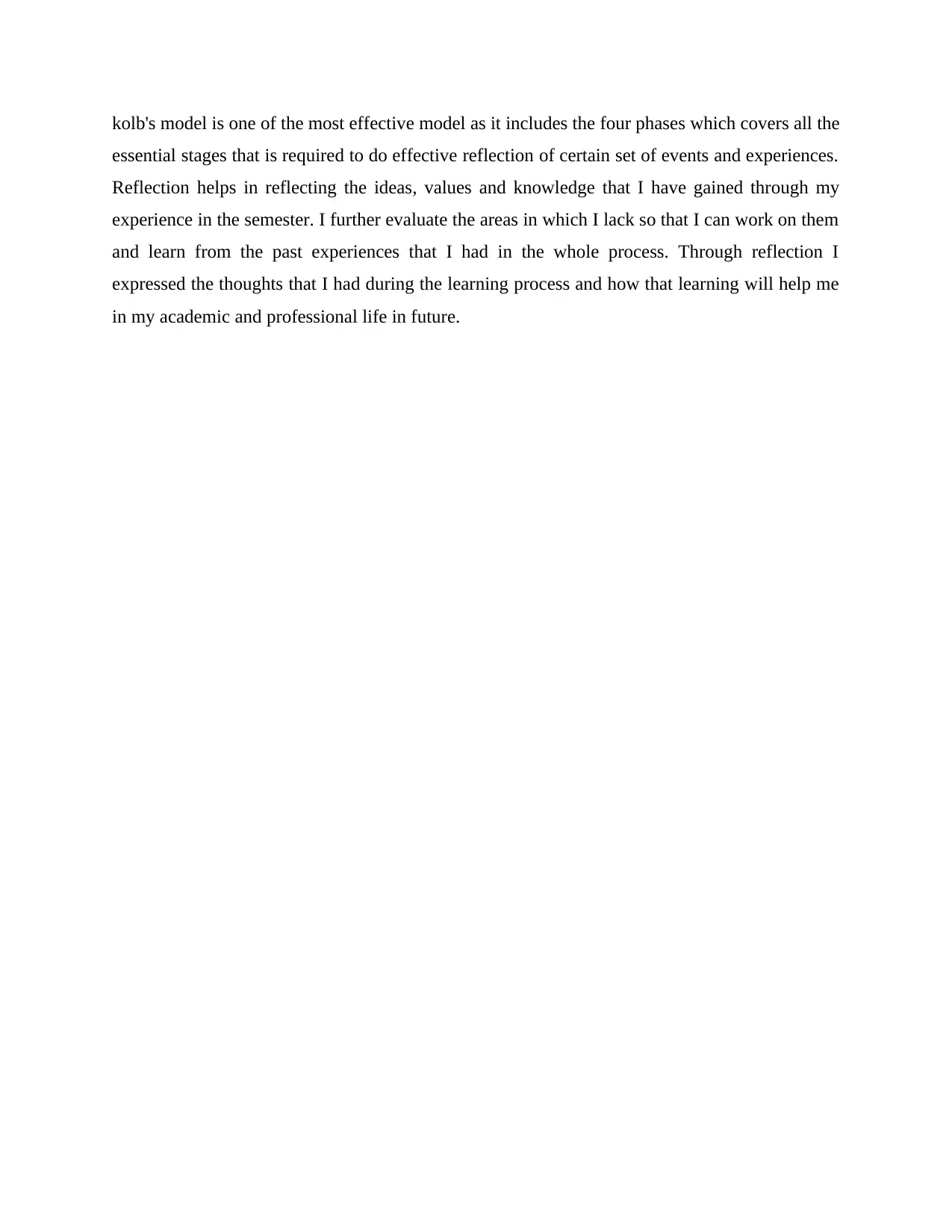
kolb's model is one of the most effective model as it includes the four phases which covers all the
essential stages that is required to do effective reflection of certain set of events and experiences.
Reflection helps in reflecting the ideas, values and knowledge that I have gained through my
experience in the semester. I further evaluate the areas in which I lack so that I can work on them
and learn from the past experiences that I had in the whole process. Through reflection I
expressed the thoughts that I had during the learning process and how that learning will help me
in my academic and professional life in future.
essential stages that is required to do effective reflection of certain set of events and experiences.
Reflection helps in reflecting the ideas, values and knowledge that I have gained through my
experience in the semester. I further evaluate the areas in which I lack so that I can work on them
and learn from the past experiences that I had in the whole process. Through reflection I
expressed the thoughts that I had during the learning process and how that learning will help me
in my academic and professional life in future.
⊘ This is a preview!⊘
Do you want full access?
Subscribe today to unlock all pages.

Trusted by 1+ million students worldwide
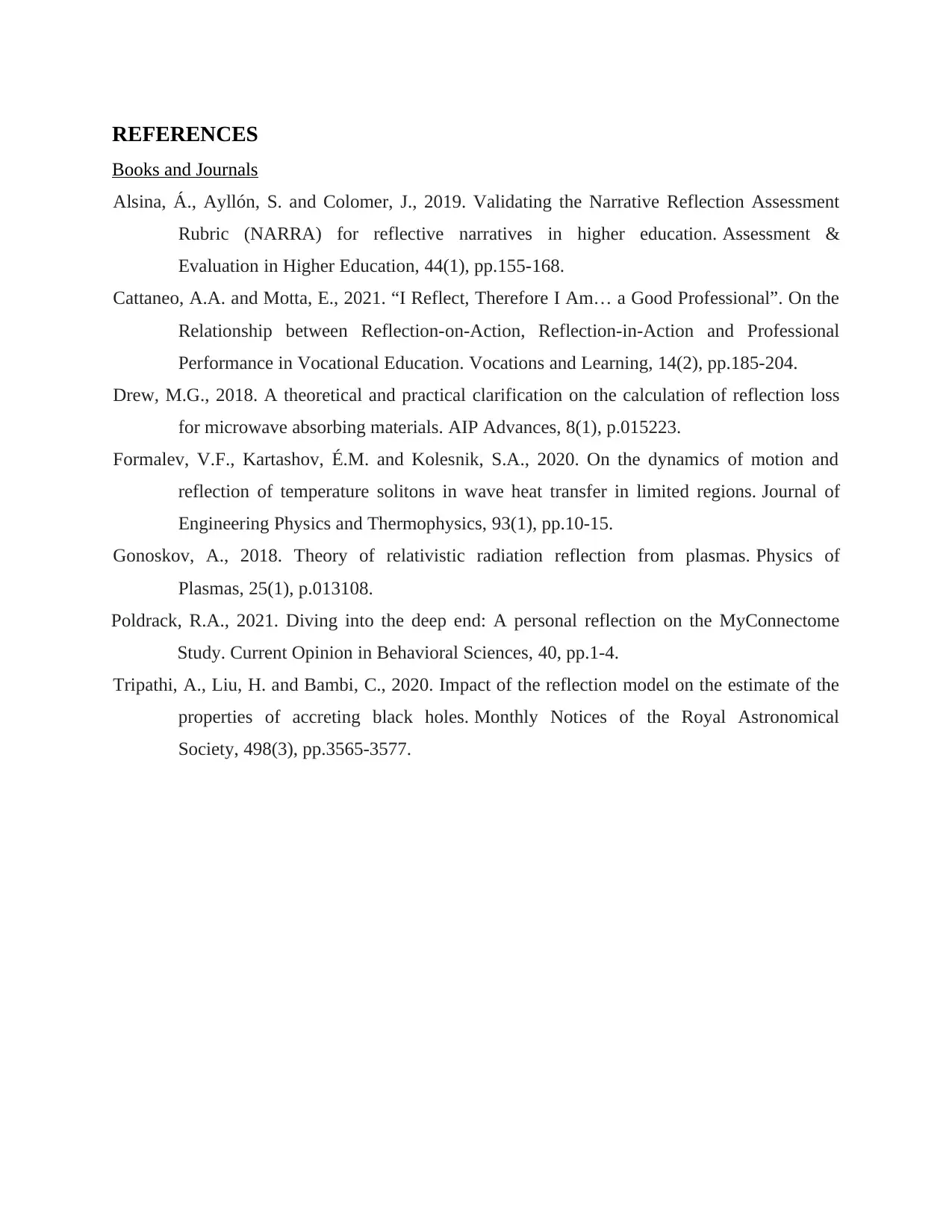
REFERENCES
Books and Journals
Alsina, Á., Ayllón, S. and Colomer, J., 2019. Validating the Narrative Reflection Assessment
Rubric (NARRA) for reflective narratives in higher education. Assessment &
Evaluation in Higher Education, 44(1), pp.155-168.
Cattaneo, A.A. and Motta, E., 2021. “I Reflect, Therefore I Am… a Good Professional”. On the
Relationship between Reflection-on-Action, Reflection-in-Action and Professional
Performance in Vocational Education. Vocations and Learning, 14(2), pp.185-204.
Drew, M.G., 2018. A theoretical and practical clarification on the calculation of reflection loss
for microwave absorbing materials. AIP Advances, 8(1), p.015223.
Formalev, V.F., Kartashov, É.M. and Kolesnik, S.A., 2020. On the dynamics of motion and
reflection of temperature solitons in wave heat transfer in limited regions. Journal of
Engineering Physics and Thermophysics, 93(1), pp.10-15.
Gonoskov, A., 2018. Theory of relativistic radiation reflection from plasmas. Physics of
Plasmas, 25(1), p.013108.
Poldrack, R.A., 2021. Diving into the deep end: A personal reflection on the MyConnectome
Study. Current Opinion in Behavioral Sciences, 40, pp.1-4.
Tripathi, A., Liu, H. and Bambi, C., 2020. Impact of the reflection model on the estimate of the
properties of accreting black holes. Monthly Notices of the Royal Astronomical
Society, 498(3), pp.3565-3577.
Books and Journals
Alsina, Á., Ayllón, S. and Colomer, J., 2019. Validating the Narrative Reflection Assessment
Rubric (NARRA) for reflective narratives in higher education. Assessment &
Evaluation in Higher Education, 44(1), pp.155-168.
Cattaneo, A.A. and Motta, E., 2021. “I Reflect, Therefore I Am… a Good Professional”. On the
Relationship between Reflection-on-Action, Reflection-in-Action and Professional
Performance in Vocational Education. Vocations and Learning, 14(2), pp.185-204.
Drew, M.G., 2018. A theoretical and practical clarification on the calculation of reflection loss
for microwave absorbing materials. AIP Advances, 8(1), p.015223.
Formalev, V.F., Kartashov, É.M. and Kolesnik, S.A., 2020. On the dynamics of motion and
reflection of temperature solitons in wave heat transfer in limited regions. Journal of
Engineering Physics and Thermophysics, 93(1), pp.10-15.
Gonoskov, A., 2018. Theory of relativistic radiation reflection from plasmas. Physics of
Plasmas, 25(1), p.013108.
Poldrack, R.A., 2021. Diving into the deep end: A personal reflection on the MyConnectome
Study. Current Opinion in Behavioral Sciences, 40, pp.1-4.
Tripathi, A., Liu, H. and Bambi, C., 2020. Impact of the reflection model on the estimate of the
properties of accreting black holes. Monthly Notices of the Royal Astronomical
Society, 498(3), pp.3565-3577.
1 out of 7
Related Documents
Your All-in-One AI-Powered Toolkit for Academic Success.
+13062052269
info@desklib.com
Available 24*7 on WhatsApp / Email
![[object Object]](/_next/static/media/star-bottom.7253800d.svg)
Unlock your academic potential
Copyright © 2020–2026 A2Z Services. All Rights Reserved. Developed and managed by ZUCOL.



